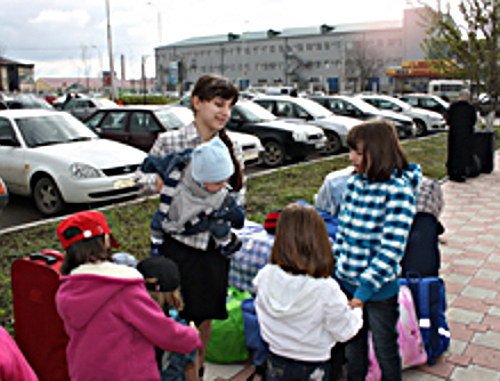Reports this week in the Belarusian media indicate that thousands of ethnic Chechens are seeking asylum in the West, despite formal denials in September by the Chechen Government.
Belnovosti writes that over the past 18 months, Poland has turned away 52,000 Chechens seeking to cross into the country from Belarus.
According to the report, around 83% of those turned away were Chechen nationals who held Russian passports.
“During the first 6 months of this year, the country (Poland) made almost 19 thousand decisions prohibiting entry into the country. These include 11,254 at the border with Belarus; 6,681 at the border with Ukraine and only 652 at the border with Russia,” Agnieszka Golijas, a Polish Border Patrol spokeswoman, told Belnovosti.
The question of to what extent Chechens are fleeing the Chechen Republic to apply for asylum in the West, particularly Germany, has become a highly politicized issue.
Chechens who have fled accuse Ramzan Kadyrov’s “feudal regime” of human rights abuses and repression, preventing freedom of speech.
In a July blog post on the website Kavkazskiy Uzel, Svetlana Gannushkina, the head of the NGO Grazhdanskoe Sodeystvie, which assist refugees, said that the number of Chechens seeking asylum in Germany had “grown exponentially” during the first half of 2013.
“The ongoing abductions, the killings that are not investigated, the fear that is prevalent now in Chechnya, is depressing, enveloping a person to such an extent that it becomes a part of his personality,” Gannushkina said:
The circumstances are terrible, there is no freedom of speech, people are afraid to talk…there is rampant cruelty, Russian law is absolutely not working, there is no place to turn — and all of this takes place because the Chechen authorities have given absolute carte blanche for any violation of human rights under the formula: “Russia is the Mother, and Putin is the Father of Chechnya.
The Chechen Government has officially denied media reports and German official statements that 10,000 ethnic Chechens have applied for asylum in Germany.
In September, the head of the Chechen government’s External Relations Department, Isa Khadzhimuradov, claimed “a large number” of the 10,000 asylum-seekers were not Chechens and had no connection with Chechnya.
The German authorities say that the Chechen influx is largely motivated by economics — i.e., by “pull factors” and not by the “push factor” of repression back home. Meanwhile, the German security authorities believe the Chechen immigration poses a security risk.
Meanwhile, Kavkaz Center, a Chechen-based anti-Russian and pro-Islamist website, which supports the Caucasus Emirate, said that there has been a “massive exodus” from Chechnya. It asserts that the conditions for the Chechen refugees are very tough, with families being detained in deportation centers in Poland and many more “languishing in prisons in Western Europe”.
Kavkaz Center — unsurprisingly, given its opposition to the Kadyrov regime — blames conditions in Chechnya for the exodus, saying this is the “humiliation” of ethnic Chechens living in the Chechen Republic under a Russian cultural system:
Chechens have fled their homeland because of unbearable living conditions, and primarily because of permanent humiliation, which is Chechen society finds very painful to tolerate.
Economic problems, unemployment, poverty — these are second-order categories, and are not decisive (factors) in the decision to leave home and go into the unknown.
The main problem for Chechens, writes Kavkaz, is “the abasement of human dignity, permanent terror, violence, the destruction of the centuries-old traditions of family and clan support and mutual protection”.
The “alien” Russians, with their culture that is incompatible with that of Chechnya, are to blame for the mass exodus of Chechens from “peaceful” Chechnya, even though the war with Russia has ended, the site continues:
The Russian infidels implanted in Chechnya the so-called “new elite” class of nouveau riche and bespredelschiki (“Mafiosi”, “bandits”), traitors and collaborators, who are based on Russian hostility and uncontrolled violence….The Chechen Socium can bear another’s authority, of perceiving foreign occupation as a temporary phenomenon, without prejudice to ethnic identity, but violence and terror on the part of “them” destroys the very foundations of Chechen society.
(Featured Photo: Chechens in Poland)

